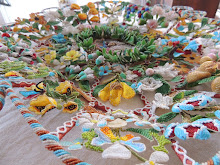18th Century Knotted Silk Fly Braids & Fringes...
Ladies get your knotting shuttles ready..... it's no wonder why 'knotting' was a popular 18th form of 'busy work'. It is made with filament silk and a knotting shuttle, very similar in looks to a tatting shuttle. One could vary the colors, and where they knotted the silk, to make either a simple braid or something quite complex. Known as 'Fly Fringe' or 'Fly Braid', it could be purchased ready made or made at home. An open robe gown could use literally hundreds of yards of trim.
This trim was reportedly part of a purse, with silk covered mirror still surviving with braid attached.
Small and extremely delicate, this is a very simple fly braid with a single knotted tuft about every inch in length of the braid. It is edging both lengths of a 14" wide skirt flounce or robing.
Here is a tiny braid without any knotted fringe~ this would have been referred to as silk gimp. I purchase this tiny strip, nearly 2 yards long but just 1.5" wide for a document piece, and was absolutely thrilled when it arrived with fragments of its original bodice back~ sized for a very young girl 6-8 years old
Lightweight Brocaded silk taffeta plaids (dress silkes) such as this were often called "Florence" in the early to mid 18th c
This is a beautiful example of a fancier "fly fringe"~ note there is NO braid, only knotted filament silk in creme to match the blossoms ~ and its absolutely stunning against the dark bottle green background
This trim is still technically a fly braid, even tho the braid itself is a fringe trim~ every 4 or 5 scallops of the trim, there is a grouping of knotted fringes. And unlike the many fragments I have here at the Museum,
this fly fringe is complete on its c1750 set of silk satin Christening sleeves, and robe, as seen in the very first photo































No comments:
Post a Comment